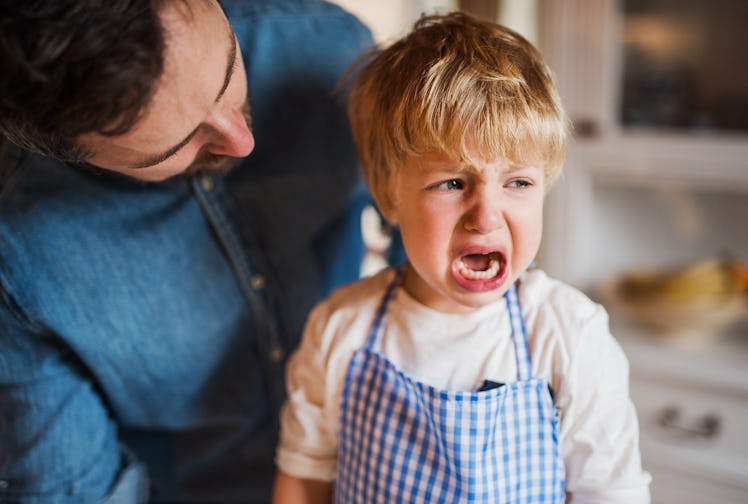If You Say These Common Phrases To Your Kid, You’re A Bully
When parents communicate the same way bullies do, it sets a bad example and makes kids feel unsafe.

Bullying remains prevalent for children in schools and online where they can be inundated with aggressive, exclusionary and threatening messages. The last thing kids need is for those messages to continue from their parents. Unfortunately, there are some phrases adults use that can make them sound a lot like the bullies kids face throughout the day.
Parents might think they are playfully joking with their child, but intent does not always correlate with impact explains child and adolescent psychologist Sophie Pierce, Psy.D. And these four specific types of communication can make parents sound like a bully, even if they aren’t trying to.
“No offense, but…”
What people typically mean when they use this phrase is that it’s likely to offend but they are going to say it anyway. “When you use this statement with kids you are communicating an awareness that you are making hurtful comments,” says Pierce. It’s a flimsy loophole that claims plausible deniability on its face while actually admitting premeditation. Bullies are quick to utilize qualifiers in order to dodge accountability, regardless of how flimsy those statements are.
Brutal honesty typically isn’t helpful honesty. And modeling a willingness to knowingly hurt another person is a habit that most parents wouldn’t want their kids to emulate. Cutting “no offense” from a parent’s vocabulary is probably going to soften how they criticize their kids.
“You’re annoying” or “You’re weird”
Hitting cool kid status is a common aspiration, but a lot of kids will settle for a level of normal that keeps them out of a bully’s focus so they aren’t called out or publicly othered. Loving and accepting children for who they are cultivates confidence, independence and the courage to try new or hard things without fear of rejection. But telling a kid they are annoying or weird might make them think twice about being their true selves.
“Statements like these are very definitive and imply a permanent state, leaving no room for growth or change,” Pierce says. “Children may hear these statements and believe that these words define their character. Additionally, these statements imply dislike towards a child. This can be particularly damaging as children look to adults to understand who they are and how the world experiences them.”
Name-Calling
“Name-calling is harmful for many reasons,” Pierce explains. “While parents may use name-calling jokingly, children may not have the developmental understanding to differentiate between jokes and criticism. Because of this lack of understanding, children may take these statements personally and internalize their messaging.”
The negative effects of giving someone an unflattering nickname shouldn’t be underestimated. The more a nickname is repeated, the more a kid can view it as describing a defining feature. So when your teenager is learning to manage all of the odors that accompany their hormones and increased activity levels, they’re unlikely to view the name “Stinky” as a term of endearment.
Teasing About Appearances
Kids are merciless when it comes to teasing each other about appearances. Since physical traits are front-and-center, they are one of the easiest things for a bully to pick out. And it’s tough to shake a reputation for any awkward or undesirable physical traits once bullies have latched onto them.
“With social media and bullying being rampant in a child’s life, children are all too aware of their perceived flaws. Therefore, the last thing a child needs is more scrutiny about the way they ‘should’ look in their home environment,” Pierce says. “Children aren’t always able to differentiate between jokes and criticism, so parents may consider being mindful about their use of teasing or sarcasm when it comes to physical traits.”
One skill that kids quickly develop is the ability to hold in the angst and insecurities that bullying causes, because bullies will keep up the abuse when they know it’s eliciting a desired response. Parents may find that using these phrases hurts their kids more than they let on, so don’t assume that your kid is unbothered just because they haven’t explicitly said so.
And paying attention to how frequently phrases that can be construed as bullying are used in conversation may help parents become more affirming and constructive in their interactions with other adults, which is a solid additional benefit.
This article was originally published on